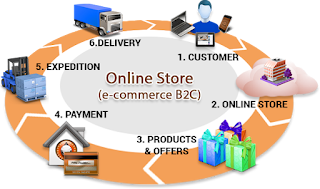With
businesses looking to get a share of the mindspace of the customer,
it is B2C ecommerce that attracts the most attention in the eye of
the media. But across the world, it is B2B ecommerce that is driving
sales. But the explosion of B2B ecommerce has meant that some
quintessential B2C characteristics have spilled over to the B2B
market as well. This article takes a look at both these models and
some of their commonalities.
The
B2B space
In
the one to many B2B ecommerce business model, companies have their
own online B2B store in which customers can purchase goods. This is a
simple model but requires a well-oiled, sophisticated supply chain
infrastructure to back it.
B2B
online sales isn’t going anywhere, it is here to stay for the long
run. And the growth of B2B ecommerce is mainly going to come from the
surge in mobile phone buying across the world. This has set off a
race among companies to put out mobile versions of their products as
the smartphone era has got people buying and selling with abandon at
the touch of a screen.
The
B2C impact?
In
the many-to-many model, many companies join to form an extensive
private network, or a marketplace that is open to suppliers of all
hues. Now, this is administered by a third-party who has the
expertise necessary to see it through.
Studies
have shown that B2B companies can greatly reduce their costs if only
they guided customers to an online ecommerce environment that is
self-service oriented. But the crucial difference between B2B and B2C
comes with fluctuation of prices. With customer-specific prices and
discounts that vary based on who is selling how much, B2C has much
more of unpredictable price changes than its content counterpart.
So
how exactly has B2C influenced B2B ecommerce? Well, in many important
areas:
- Customization
- Making catalogs more attractive
- Inventory availability in real time
With
facilities like real-time inventory availability, B2B has made itself
more attractive to the lay businessman because it does away with
unnecessary third-party links in the supply chain. Add customer
reviews to customization and personalization and you get an almost
B2C-like environment!



I am happy to find your distinguished way of writing the post. Now you make it easy for me to understand and implement the concept. Thank you for the post.
ReplyDeleteBest B2b ecommerce platforms
Hola i would really love to subscribe and read your blog posts .! referral coupons
ReplyDelete\Wow, this is really awesome information on eCommerce web development I like it very much even I bookmarked your blog for further information.
ReplyDelete